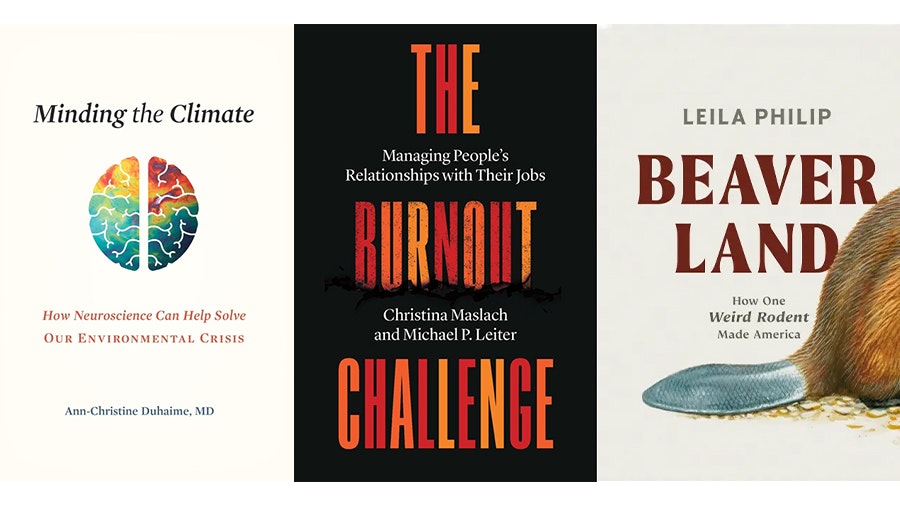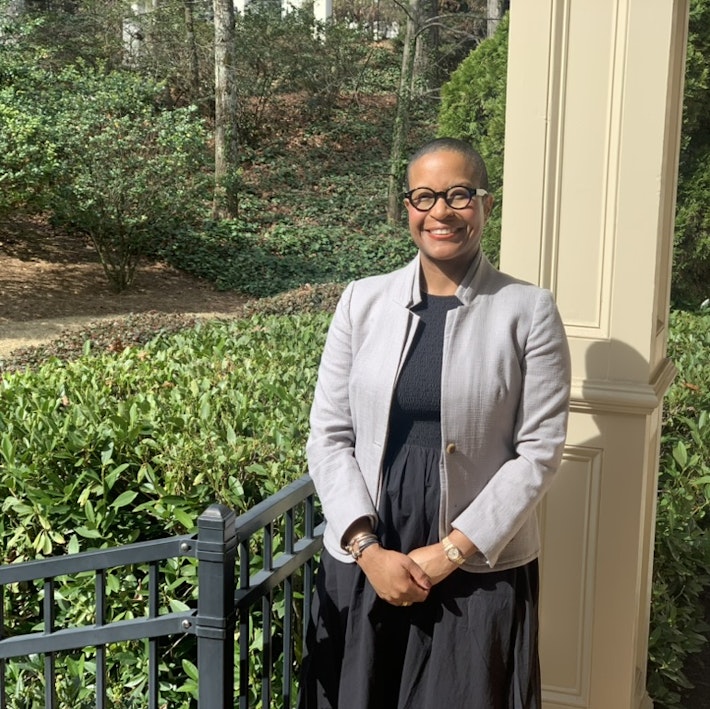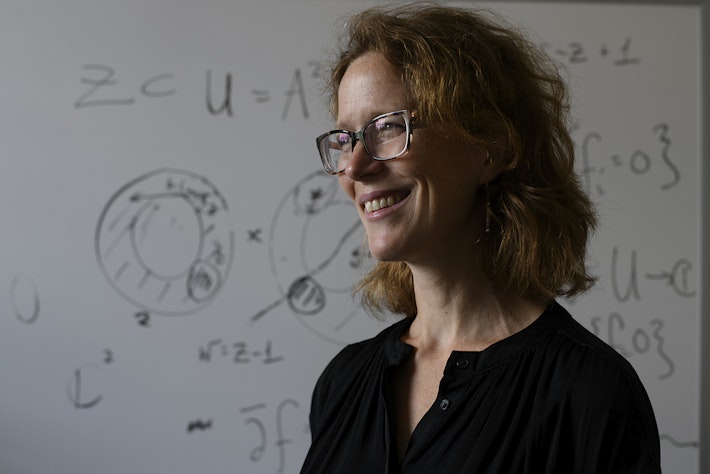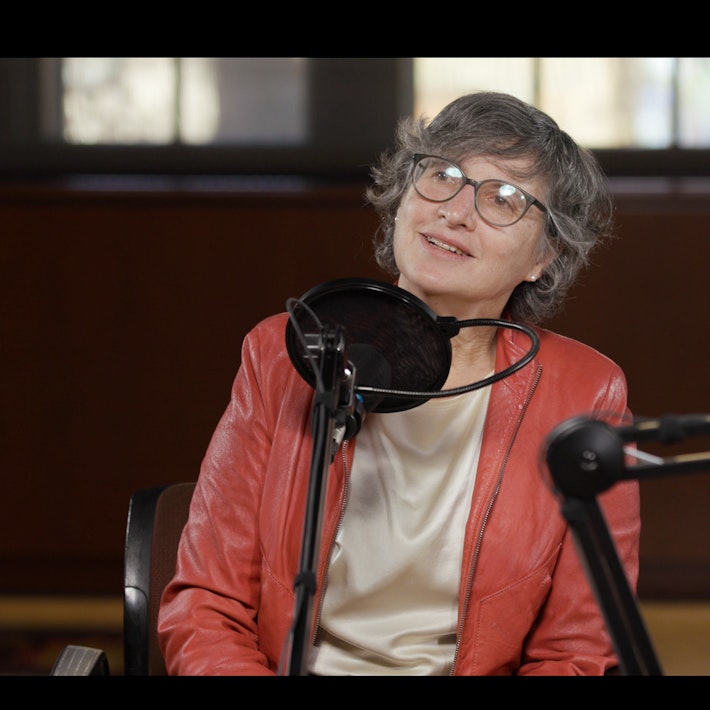Newsmakers | Fall 2022

The Newsmakers section of Radcliffe Magazine brings the extraordinary achievements of Radcliffe alumnae, faculty, and fellows to our readership. Please tell us about your awards, publications, and other accomplishments by e-mailing magazine@radcliffe.harvard.edu.
In November, TAKREEM Foundation honored Hala Zreiqat RI ’17 with its 2022 Scientific and Technological Achievement Award, in recognition of her contributions to the field of biomaterials and tissue engineering. She traveled to Abu Dhabi, United Arab Emirates, to accept the award.
Tuna Şare Ağtürk RI ’19 won the Archaeological Institute of America’s 2023 James R. Wiseman Book Award for her book The Painted Tetrarchic Reliefs of Nicomedia, Uncovering the Colourful Life of Diocletian’s Forgotten Capital (Brepols, 2021), on which she worked during her fellowship. “She shows that the new iconography went through a transitional phase that has not been known previously,” wrote the organization in the award announcement. “This study expands our knowledge of material and visual culture well beyond the traditional focus on Rome.”
The Other Side of Terror: Black Women and the Culture of US Empire (NYU Press, 2021), by Erica R. Edwards RI ’18, earned the 2022 John Hope Franklin Publication Prize, awarded by the American Studies Association for the best book in American studies. The Other Side of Terror “exemplifies and advances the very best of American studies interdisciplinarity by offering at once a stunningly original analysis of US counterinsurgent power and a new way of reading Black women’s expressive culture,” wrote the ASA in its announcement of the 2022 prize recipients.
A number of Radcliffe affiliates can be found among the 2022 MacArthur Fellows, announced last month: the artist and filmmaker Sky Hopinka RI ’19; the writer Kiese Laymon RI ’21; the physician and researcher Emily Wang ’97; and the mathematician Melanie Matchett Wood RI ’22, who is a Radcliffe Alumnae Professor.
The American Library Association announced its longlist for the 2023 Andrew Carnegie Medals for Excellence in Fiction and Nonfiction. The Invisible Kingdom: Reimagining Chronic Illness (Riverhead Books, 2022), by Meghan O'Rourke RI ’15, and Solito (Hogarth, 2022), by Javier Zamora RI ’19 (see Shelf Life, below), were among the 21 nonfiction books on the list.
Carolyn R. Bertozzi ’88 was among the three scientists awarded the Nobel Prize in Chemistry. In its citation, the award committee cited “the development of click chemistry and bioorthogonal chemistry” as the prize motivation, further noting on the Nobel website that she “took click chemistry to a new dimension and began using it to map cells. Her bioorthogonal reactions are now contributing to more targeted cancer treatments, among many other applications.” She is the first female graduate of Harvard College to win a Nobel, said the Harvard Crimson.
The Hutchins Center for African & African American Research included the Nigerian writer Chimamanda Ngozi Adichie RI ’12 among the seven luminaries honored with a 2022 W. E. B. Du Bois Medal. The honorees “exemplified the award’s theme of extraordinary commitment to social justice,” said a Harvard Gazette article about the awards ceremony. Because of the pandemic, it was the first time that the medal has been awarded since 2019.
Among the National Book Awards finalists were Best Barbarian (W. W. Norton, 2022), by Roger Reeves RI ’22, in the poetry category and The Invisible Kingdom: Reimagining Chronic Illness (Riverhead Books, 2022), by Meghan O'Rourke RI ’15, in the nonfiction category. Imani Perry JD ’00, PhD ’00, who will join Radcliffe this coming July as a Carol K. Pforzheimer Professor, won in the nonfiction category for South to America: A Journey below the Mason-Dixon to Understand the Soul of a Nation (Ecco, 2022).

Watch the 2022 TAKREEM laureate Hala Zreiqat accept her award.
Tanisha C. Ford RI ’19 sang the praises of what she calls “arguably the longest-running African American family drama in history” in “The Remarkable Legacy of Queen Sugar,” published in Time. “The nuanced characters, lighting that celebrated the beauty of melanated skin, and soulful soundtrack galvanized a legion of Twitter fans who shared their commentary using #gimmiesugar,” said Ford. The show ended in late November after a seven-season run.
In “Why 2 Is the Best Number and Other Secrets from a MacArthur-Winning Mathematician,” Scientific American talked to the recent MacArthur winner Melanie Matchett Wood RI ’22 about her life and work.
The deadly shooting at Club Q in Colorado Springs, which took place on Transgender Day of Remembrance, injured 17 people and claimed five lives. In the aftermath, Jennifer Finney Boylan RI ’23 published the Washington Post opinion piece “The LGBTQ Family Is United by Our Fear for Our Lives,” in which she details a number of anti-LGBTQ incidents over the past few months. Earlier, when Florida barred trans people from using Medicaid to help pay for gender-affirming care, she published the opinion piece “Is Being Transgender a Medical Condition?”
Following unflattering headlines about four highly visible plutocrats—Sam Bankman-Fried, Jeff Bezos, Elon Musk, and Donald Trump—Anand Giridharadas RI ’23, who has been critical of billionaires in the past, published the New York Times guest essay “This Week, Billionaires Made a Strong Case for Abolishing Themselves.” (Giridharadas is the author of Winners Take All: The Elite Charade of Changing the World [Vintage, 2019].)
After 156 people were crushed to death during a Halloween celebration in South Korea’s capital city, the writer Suki Kim RI ’22 published the New York Times guest essay “The Immensity of Seoul’s Sadness.” “Halloween now exists in the shifting space—cultural and geographic—between the United States and South Korea,” writes Kim. “Yet the Halloween deaths of so many young Koreans, who were following a Japanese twist on an American holiday in the most American part of Seoul, are an uncomfortable reminder of the tension between South Korea and foreign powers.”
The linguists Damián E. Blasi RI ’20 and Asifa Majid RI ’23 were among the cowriters of the research paper “Over-reliance on English Hinders Cognitive Science,” published in Trends in Cognitive Science. In it, the researchers review evidence that suggests that the linguistic habits of English speakers cause bias in cognitive science, and they propose “mitigating strategies” that focus on linguistic diversity in the field.
Manisha Sinha RI ’20 published a CNN Opinion piece titled “Why I Hope 2022 Will Be Another 1866,” drawing a number of parallels between the political situation of the two midterm election years. “Then as now democracy is at stake,” she concludes.
In the New York Times article “These Doctors Admit They Don’t Want Patients with Disabilities” and the Boston Globe (10/6) article “Some Doctors Are Reluctant to Care for Patients with Disabilities, Study Finds,” Lisa I. Iezzoni SM ’78, MD ’84, RI ‘23 provides some context to a study to which she contributed that revealed disturbing negative attitudes held by doctors toward patients with disabilities. “‘I Am Not the Doctor for You’: Physicians’ Attitudes About Caring for People with Disabilities” ran in the October 2022 issue of Health Affairs, alongside other research articles bearing her byline: “Have Almost Fifty Years of Disability Civil Rights Laws Achieved Equitable Care?” and “Delayed Medical Care and Unmet Care Needs Due to the COVID-19 Pandemic among Adults with Disabilities in the US.” An earlier paper on a related topic, “Cancer Detection, Diagnosis, and Treatment for Adults with Disabilities,” was published in Lancet Oncology.
Civil Rights Queen: Constance Baker Motley and the Struggle for Equality (Pantheon, 2022), by Dean Tomiko Brown-Nagin RI ’17, continues to garner ink: an article in the Los Angeles Review of Books, “Which Way the NAACP: On A. J. Baime’s White Lies and Tomiko Brown-Nagin’s Civil Rights Queen,” considers it alongside another book about an underappreciated civil rights figure, and World Literature Today published a review of the biography.
After a water treatment plant failure left upward of 150,000 Jackson, Mississippi, residents without access to safe drinking water, W. Ralph Eubanks RI ’22 published a CNN opinion piece, “The Endgame to Jackson’s Water Crisis? ‘Black Death.’” In the piece, Eubanks points out that Jackson is a majority-Black city in a state governed by a White Republican supermajority that has long neglected the city’s infrastructure. “How could a state ignore the needs of the residents of its capital city and allow things to deteriorate to this point?” asks Eubanks. “The answer as I see it is simple: racism.” (On October 31, the Environmental Protection Agency determined that Jackson water is once again safe to drink—two months after the crisis began.)
Canada’s Globe and Mail published an in-depth profile of the poet Jana Prikryl RI ’18 in advance of her third poetry collection, Midwood (W. W. Norton, 2022), “In Midwood, Canadian Poet Jana Prikryl Takes On Midlife Motherhood.” The Nation reviewed the poetry collection in “Jana Prikryl’s Poetry of Perpetual Motion.” Elsewhere in this issue, read our book editor’s review and a Q and A with the poet [LINKS WHEN READY].
As an undergraduate, Sheila Tobias ’57 was discouraged from pursuing a path in science. Twenty years later, she coined the term “math anxiety” for Ms. magazine. “Gloria Steinem, a leader of the women’s movement and a founder of the publication, considered [Tobias’s article] ‘one of the most important pieces we’ve ever published,’” notes the New York Times in “Sheila Tobias, Who Defined ‘Math Anxiety,’ Dies at 86.“ Tobias died on July 6, 2021, although the death went mostly unreported until the Times profile.
The Globe Magazine published a profile of the poet and professor Tracy K. Smith ’94, a Pultizer Prize winner and two-term US poet laureate. The article, “Can Poetry Possibly Matter in a Time Like This? Harvard’s Tracy K. Smith Knows the Answer,” also examined the rising popularity of poetry in our pandemic times: “Poetry is having a moment, in large part because poets such as [Amanda] Gorman [’20] and Smith are ready to meet the moment—with ambitious questions, incomplete answers, and what Smith calls ‘empathetic imagination.’”
In an interview with the Wall Street Journal, Michael Pollan RI ’16 shared his morning routine and more, including his predictions for the future of psychedelics in the United States.

Books by Ann-Christine Duhaime, Christina Maslach, and Leila Philip
Christina Maslach ’67 has published The Burnout Challenge: Managing People’s Relationships with Their Jobs (Harvard University Press, 2022), coauthored with Michael P. Leiter. “With the Great Resignation looming large, this timely, practical guide is worth a look for business leaders aiming to foster a healthy workplace,” said a review in Publishers Weekly, which also included the book in a roundup of the top 10 books in business and economics. Maslach is a professor of psychology, emerita, and core researcher at the Healthy Workplaces Center at the University of California, Berkeley. She developed the Maslach Burnout Inventory in 1981.
In his latest book of essays, Inciting Joy (Algonquin Books, 2022), Ross Gay RI ’16 writes about the joy inspired by caring for others. When asked about the difference between delight (on which he’s written in the past) and joy for a Boston Globe Q and A, the decorated poet and essayist said, “Things like time are a component of delight: You have time to walk, smell the flowers, have a conversation. ... Joy is a more grave emotion that’s effectively born of our sorrows, born of our heartbreaks.” See our book editor’s review.
Writing Islands: Space and Identity in the Transnational Cuban Archipelago (University Press of Florida, 2022), by Elena Lahr-Vivaz RPC ’96, presents a comparative analysis of the writings of contemporary Cuban writers—both those in exile and those writing on the island. Lahr-Vivaz is an associate professor of Spanish at Rutgers University–Newark.
In The Sounds of Life: How Digital Technology Is Bringing Us Closer to the Worlds of Animals and Plants (Princeton University Press, 2022), Karen Bakker RI ’23 does a deep dive on the technology being developed that could facilitate communication with nonhumans—flora as well as fauna. The title was the November pick for NPR’s SciFri Book Club and an October nominee for Malcolm Gladwells’s Next Big Idea Club. See our book editor’s review.
Published in October, The Persuaders: At the Front Lines of the Fight for Hearts, Minds, and Democracy (Knopf, 2022), by Anand Giridharadas PhD ’16, RI ’23, is already a best seller. Kirkus Reviews deemed the book a “welcome, revealing study of how political messages can be shaped positively to counter both enmity and disinformation,” and the nonfiction book critic for the New York Times said, “While the world seems to counsel despair, The Persuaders is animated by a sense of possibility: ‘Sometimes there were cracks that let a new thought in.’”
Ann-Christine Duhaime RI ’16 has published the book on which she worked during her Radcliffe fellowship. Minding the Climate: How Neuroscience Can Help Solve Our Environmental Crisis (Harvard University Press, 2022) examines how we can harness science to change consumer behaviors and help alleviate climate change. “Duhaime’s original angle sets her work apart from the pack, and she easily translates complex neurology for nonspecialists,” said a Publishers Weekly review. “Climate-minded readers will find this full of insight.” Minding the Climate was another October nominee for Malcolm Gladwells’s Next Big Idea Club.
Javier Zamora RI ’19 first explored his long, solo journey to the United States as a minor in his debut poetry collection, Unaccompanied (Copper Canyon Press, 2017). Now he’s back with a memoir, Solito (Hogarth, 2022), told in the voice of his nine-year-old self. The New York Times profiled the author in the article “Javier Zamora Carried a Heavy Load. He Laid It to Rest on the Page.“ See our book editor’s review.
Getting to Diversity: What Works and What Doesn’t (Belknap Press, 2022), by Frank Dobbin RI ’07 and Alexandra Kalev, expands on a topic that the authors have studied for some time: diversity efforts in American workplaces. Dobbin and Kalev “upended the conventional wisdom of diversity and inclusion practitioners with their seminal article ‘Why Diversity Programs Fail,’” said Ben-Saba Hasan, Walmart’s top DEIB officer, in advance praise. “Now they’re back with a data-driven book about one of corporate America’s most pressing contemporary issues, offering up required reading that is certain to shift the paradigm once again.”
Jana Prikryl RI ’18 has published her third poetry collection, Midwood (W. W. Norton, 2022), which, said Nathan Blansett in the Los Angeles Review of Books, “makes clear and unmistakable the increasing singularity of her artistry.” Elsewhere in this issue, read our book editor’s review and a Q and A with the poet.
In Making Their Days Happen: Paid Personal Assistance Services Supporting People with Disability Living in Their Homes and Communities (Temple University Press, 2021), Lisa I. Iezzoni SM ’78, MD ’84, RI ‘23 examines the world of the paid personal assistance services workers who help those with complex medical needs—an issue she addresses form a number of angles. “Making Their Days Happen is an extraordinary work,” said a review in Disability and Health Journal. “As many advocates and policymakers at the local, state, and federal levels grapple with the workforce crisis, this book advances our knowledge of the issues and the real-life impacts of policies on the people’s lives, hopefully leading us forward.”
Forthcoming in December, Beaverland: How One Weird Rodent Made America (Twelve, 2022), by Leila Philip BI ’93, makes connections between the semiaquatic mammal’s place in American history and in our country’s ecological future. “Philip’s vivid narrative is enriched by Native American legend (she relays the ‘Algonquian deep time saga of Ktsi Amiskw, the Great Beaver’), entertaining accounts of beaver devotees (including one woman who, in the 1930s, shared her farmhouse with 14 beavers), and sharp prose,” said Publishers Weekly in a starred review. “The result is a triumph of popular nature writing.”
Next month, Tsitsi Dangarembga RI ’23 will publish the essay collection Black and Female (Graywolf Press, 2023), an exploration of race and gender in the context of colonialism. Kirkus Reviews called it “a well-informed, biting analysis of the legacy of empire,” and Publishers Weekly gave it a starred review. Dangarembga, who is from Zimbabwe, is a writer, filmmaker, playwright, and the director and founder of the Institute of Creative Arts for Progress in Africa Trust.
Forthcoming from Rebecca Jo Plant RI ’06 is Of Age: Boy Soldiers and Military Power in the Civil War Era (Oxford University Press, 2023), which she wrote with Frances M. Clarke. The publisher notes that it is the only book-length study of underage enlistment in the US Civil War. Plant is a professor of history at UC San Diego.
Wild, Beautiful, and Free (Lake Union Publishing, 2023), a novel by Sophfronia Scott ’88 forthcoming in March, retells the story of Jane Eyre—with the twist of a Civil War setting and a biracial protagonist. “Scott will most assuredly be recognized for her superb storytelling,” said Booklist in a review for a previous book.
Brake Run Helix, a large-scale installation by EJ Hill RI ’19, opened at the Massachusetts Museum of Contemporary Art (MASS MoCA) late last month—his first solo museum exhibition, which grew out of his work at Radcliffe. Hill and his work—which at MASS MoCA includes “Brava!,” a working roller coaster for visitors—were featured in the New York Times article “EJ Hill Wants to Take You on a Ride.”
Earlier this year, Susan Meiselas EdM ’71, RI ’19 and Marta Gentilucci PhD ’17, RI ’19 collaborated on the Cartographies du corps exhibition for Les Rencontres Internationales de la photographie d’Arles, in France. The video installation in the Église Saint-Blaise (a onetime monastery founded in the sixth century) “traces a map of the skin and the gestures of aging women that speak about engaged lives, still filled with energy, full of beauty—a beauty that comes from the layering of their experience,” says the exhibition website.
In the new year, Every Ocean Hughes RI ’20 will enjoy a solo exhibition at the Whitney Museum of American Art. Every Ocean Hughes: Alive Side, on display from January 14 to April 2, 2023, will include her photographic series The Piers Untitled alongside three works inspired by her training in death care, including a brand-new commission for the Whitney.

Watch the trailer for Paz Encina's award-winning film Eami.
The Harvard Film Archives included the Paraguayan film director Paz Encina RI ’23 in its series ¡Rebeladas! Una aproximación al cine de mujeres en Latinoamérica. Her most recent feature-length film, Eami (2022), which won the Tiger Award at the 2022 Rotterdam International Film Festival, closed out the series, which ran from September 23 to December 2, 2022. Encina was on hand for a conversation after the screening.
A recent episode of the PBS series The Bigger Picture with Vincent Brown RI ’06, “How an FBI Poster Became a Black Power Symbol,” considers the impact of Angela Davis’s image and the ways in which style can be a form of political activism. The program included insight from Tanisha C. Ford RI ’19, an expert on Black fashion and culture. The poster is in the Angela Y. Davis Papers at our Schlesinger Library and appeared in the exhibition Angela Davis: Freed by the People.
Fresh off her leave from Harvard while she serves as the director of nutrition security and health equity for the Food and Nutrition Service at the US Department of Agriculture, Sara Bleich PhD ’07, RI ’19—a professor of health policy at the Harvard Chan School—will serve as Harvard’s inaugural vice provost for special projects. In her new role, Bleich will lead ongoing work related to the recommendations from the Presidential Committee on Harvard & the Legacy of Slavery.
In an episode of the Harvard Kennedy School (HKS) podcast PolicyCast, “Why Empowered Women Are Authoritarianism’s Targets—and How They Can Be Its Undoing,” Erica Chenoweth RI ’22, a Susan S. and Kenneth L. Wallach Professor at Radcliffe and the Frank Stanton Professor of the First Amendment at HKS, and Zoe Marks, a lecturer in public policy at HKS, say rising authoritarianism and repression of women are “mutually reinforcing ills”—but that robust participation by women makes democracy and social movements more likely to succeed.
In early November, the novelist Gish Jen ’77, BI ’87, RI ’02 and the journalist Mary Kay Magistad RI ’02 reunited at the Asia Society in New York for a conversation about the past 50 years of US–China relations, which inspired Jen’s Thank You, Mr. Nixon (Knopf, 2022). Magistad, a former Beijing-based China correspondent, is the associate director of the Asia Society’s Center on U.S.-China Relations.
Members of the Radcliffe family appeared at the 2022 Boston Book Festival as presenters or headliners, including Rachel Barenbaum ’98, MBA ’04, author of Atomic Anna (Grand Central Publishing, 2022); Daphne A. Brooks RI ’11, who wrote the award-winning Liner Notes for the Revolution: The Intellectual Life of Black Feminist Sound (Belknap Press, 2021); Tomiko Brown-Nagin RI ’17, our dean and the author of Civil Rights Queen: Constance Baker Motley and the Struggle for Equality (Pantheon, 2022); Erica Chenoweth RI ’22, who published Civil Resistance: What Everyone Needs to Know (Oxford University Press, 2021); Martha Collins BI ’83, author of the poetry collection Because What Else Could I Do (University of Pittsburgh Press, 2019); Ross Gay RI ’16, whose new essay collection is Inciting Joy (Algonquin Books, 2022); Gish Jen ’77, BI ’87, RI ’02, who returned to short stories with Thank You, Mr. Nixon (Knopf, 2022); Joan Naviyuk Kane ’00, RI ’20, the author of Dark Traffic (University of Pittsburgh Press, 2021), and whom we featured in a Q and A last year; Rajani LaRocca ’92, MD ’96, author of the award-winning middle-grade novel Red, White, and Whole (Quill Tree Books, 2021); and Gail Mazur BI ’97, RI ’09, author of Land’s End: New and Selected Poems (University of Chicago Press, 2020).
In August, Feryal Özel PhD ’02, RI ’13 delivered this year’s prestigious J. Robert Oppenheimer Memorial Lecture, titled “Black Holes: From Oppenheimer’s Ideas to the First Direct Images.” Özel, who is a co-investigator for the Neutron Star Interior Composition Explorer Mission, is newly the chair of Georgia Tech’s School of Physics.







